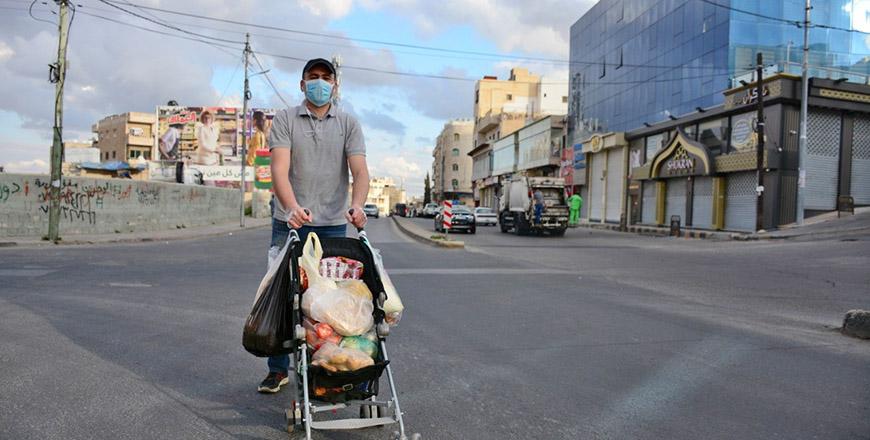- Local News
- Mon-2020-04-13 | 02:17 pm

"At the beginning, we faced tremendous challenges trying to keep up with the overwhelming demand, but now things are easier for customers and workers are more familiar with the precautions while shopping,” Hasan Daoud, a greengrocer based in east Amman, told The Jordan Times on Sunday.
The shop provides hand sanitiser, non-medical face masks and gloves for customers who come to shop without bringing along these essential "safety accessories” to combat the rapidly spreading virus, he said.
The purpose for having strict policies in the shops is to protect the worker and the customer, Daoud said, noting: "We allow only four persons to shop at a time.”
Others must wait in front of the main entrance to the shop, while following social distancing rules. When one customer comes out of the shop, another is allowed in. This measure reduces close contact and encourages safety practices, he noted.
"We have seen positive behaviours during this hard and uncertain time,” the greengrocer commented.
Initially, some stores were not taking precautions, but after seeing neighbouring shops, they have been encouraged to better care for their customers’ safety, he noted.
"Unfortunately, some people come and shop only for fun,” Daoud added, noting that others sometimes cannot purchase produce because the store is jammed.
"There is no need to be selfish, especially during this crisis,” he said.
Meanwhile, Rami Abdulrahman, a butcher, told The Jordan Times over the phone that all meat contact surfaces in his shop are periodically cleaned and sanitised, to meet the heightened hygiene standards, particularly amid the pandemic.
"Sanitation and hygiene is the most important part of our work, and what was added to our daily routine is social distancing,” Abdulrahman said.
Mariana Said, a Jordanian citizen living in Amman, told The Jordan Times on Sunday that she avoids going out to purchase essential commodities by turning to delivery services.
She said that when she receives her orders, she wipes down all the cans, bottles and cleaning products, washes all vegetables and fruits and washes her hands thoroughly before and after touching the shopping bags.
Noor Ahmad, a 22-year-old Jordanian citizen said that she tries to limit her visits to mini markets, but when it becomes necessary, she brings her own hand sanitiser, wet wipes and ATM card without any cash on hand, for fear that cash could be a source of spreading the virus.
"The hardest part of my trip to the market is not being able to touch my face, but at the same time, I know the moment I touch the shopping cart handle I have thousands of other people’s bacteria on my hands,” Ahmad noted.
As soon she returns from her outing, she washes her hands and immediately takes a shower.
"This is a new virus, so every precaution is necessary because every day, new studies and reports are being published,” she added.










